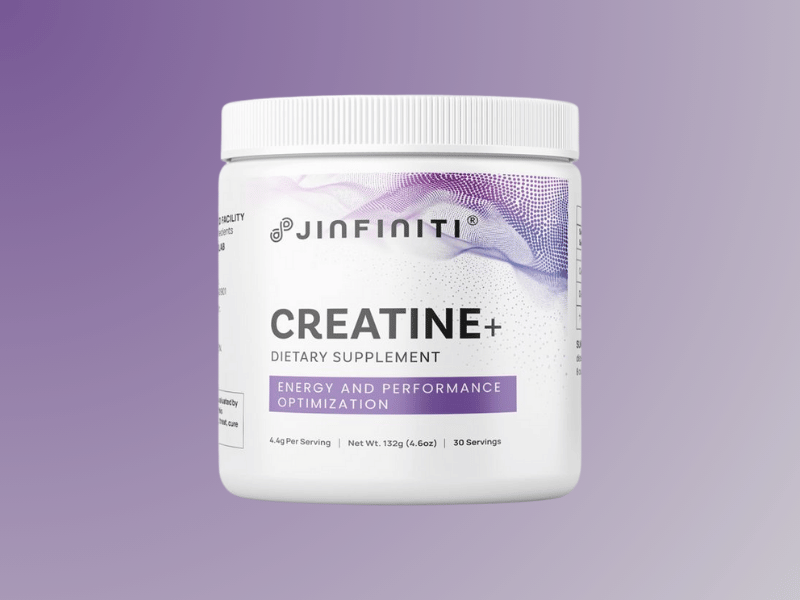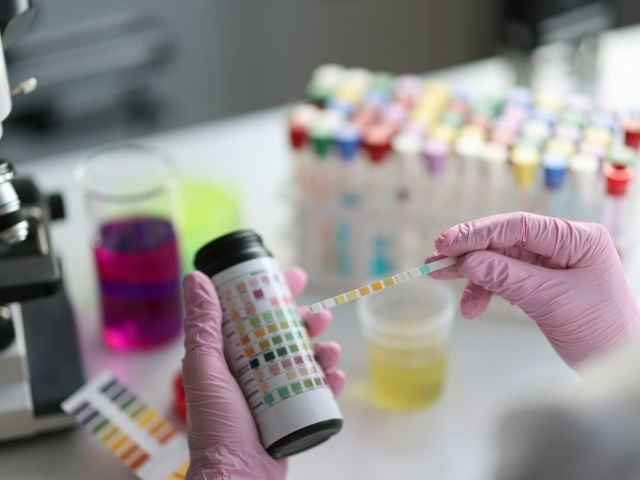
Should Vegan Athletes Take Creatine Supplements?
If you’re a plant-based athlete who trains hard, you’ve probably had questions about creatine supplementation. Is it diet-friendly? Does it make sense to take? The short answer to both questions is “yes” – and the research is very clear.
Creatine is one of the most studied supplements in sports nutrition. The evidence is even more compelling for vegan athletes when you understand how the body makes and stores this compound.
Quick Summary
- Vegans and vegetarians typically have 20-30% lower muscle creatine stores compared to meat eaters due to lack of dietary sources
- Research shows that vegan athletes often respond better to creatine monohydrate supplementation than omnivores
- A standard dose of 3-5 grams of creatine per day can help plant-based athletes match or exceed the muscle creatine levels of meat eaters
- Creatine monohydrate is naturally vegan and offers benefits for both physical and mental performance
What is Creatine?
Creatine is a naturally occurring compound your body makes from three amino acids: glycine, arginine, and methionine. About 95% of your body’s creatine lives in skeletal muscle tissue, where it drives energy production.
Your liver, kidneys, and pancreas handle creatine synthesis on their own. But here’s the catch: your body can only produce about 1 gram per day.
The rest comes from food, primarily animal products like red meat and fish. This is where vegan athletes face a gap.
How Creatine Supports Athletic Performance
Inside your muscles, creatine converts to phosphocreatine. This stored form helps regenerate adenosine triphosphate (ATP), the molecule that powers muscle contractions.
When you lift weights or sprint, your muscles burn through ATP quickly. Phosphocreatine steps in to recharge ATP within seconds, letting you maintain power output during intense bursts of activity.
Higher creatine stores mean you can perform more reps, lift heavier weights, or sustain high-intensity efforts longer. Over time, this translates to greater training adaptations and improved athletic performance.
Do Vegan Athletes Have Lower Creatine Levels?
Research consistently shows that people following a vegan diet have lower muscle creatine concentrations than omnivores. One study published in the Journal of the International Society of Sports Nutrition found vegetarians and vegans had muscle creatine levels roughly 20-30% below those of meat eaters1.
This makes sense when you look at dietary intake. An omnivore consuming meat and fish might get 1-2 grams of creatine per day from food alone. Add that to the body’s natural production, and you’re looking at total creatine availability of 2-3 grams daily.
Plant-based eaters get zero dietary creatine. Your body still manufactures that 1 gram per day through creatine synthesis, but without food sources to supplement this amount, your creatine stores never reach the same levels as someone eating animal products.
The difference becomes more pronounced during periods of heavy training. When you push your muscles hard through resistance training or high-intensity exercise, creatine demands increase. Your baseline production may not keep pace.
Benefits of Creatine Supplementation for Vegans
Studies suggest that people with lower baseline creatine stores see greater improvements when they start supplementing. Vegans and vegetarians often experience more dramatic benefits than omnivores.
Performance Benefits for Plant-Based Athletes
A 2020 review compared creatine supplementation responses between vegetarians and meat eaters. The vegetarian groups showed larger increases in muscle creatine content and greater improvements in lean tissue mass2.
Performance can be seen across multiple domains:
- Greater increases in strength during weight training programs
- Improved power output during repeated sprint efforts
- Better capacity to increase muscle mass when combined with resistance training
- Faster recovery between high-intensity exercise bouts
When your creatine stores start lower, you have more room to improve. Taking 3-5 grams of creatine per day can bring your levels up to or even above those of non-vegetarian athletes.
The connection between creatine and ATP goes beyond just filling a dietary gap. You’re giving your body the raw materials to perform at your peak.
Cognitive Benefits Beyond the Gym
Your brain uses creatine too. It needs ATP for neurotransmitter production, maintaining cell membrane potentials, and supporting overall cognitive function. Lower dietary intake means your brain may be running below optimal levels.
Research published in Proceedings of the Royal Society B found that vegetarians taking creatine supplements showed improvements in working memory and cognitive processing speed3.
Creatine as a nootropic can help you stay sharper during training, work, and daily activities. This becomes particularly relevant during periods of sleep deprivation or mental stress.
Lab-Tested Creatine + ATP
Vegan-friendly creatine with ATP for superior muscle gains.

How Should Vegan Athletes Take Creatine?
Getting started with creatine supplementation is straightforward. The approach for vegan athletes doesn’t differ much from standard protocols.
Recommended Dosage for Vegans
You have two main options for starting creatine monohydrate supplementation:
Loading Phase Approach
Take 20 grams per day split into 4 doses of 5 grams each for 5-7 days. This saturates your muscle creatine stores quickly. After loading, drop to a maintenance dose of 3-5 grams daily.
Steady Dose Approach
Skip the loading phase and take 3-5 grams of creatine per day from the start. Your stores will reach the same saturation point after about 3-4 weeks. This method causes fewer digestive issues for some people.
Both approaches work equally well long term. The loading phase just gets you to peak levels faster. Most vegan athletes do fine with the steady approach of 3-5 grams daily.
Some evidence suggests vegans and vegetarians might benefit from the higher end of this range (4-5 grams) since they’re starting from lower baseline levels.
| Approach | Daily Dose | Duration | Time to Saturation |
|---|---|---|---|
| Loading Phase | 20g (4 x 5g) | 5-7 days | 1 week |
| Maintenance (after loading) | 3-5g | Ongoing | Immediate |
| Steady Dose | 3-5g | Ongoing | 3-4 weeks |
Best Vegan Creatine Supplements
Creatine monohydrate is naturally vegan. The manufacturing process synthesizes it from non-animal sources.
Monohydrate remains the most studied form with the strongest evidence base. Other types of creatine like creatine ethyl ester or buffered creatine don’t offer proven advantages.
Look for products that display third-party testing certifications. This confirms purity and accurate dosing.
Some vegan athletes may benefit from formulas that combine creatine with disodium ATP. Research shows that 400mg of oral ATP daily alongside resistance training produces greater gains in muscle mass, strength, and power compared to training alone4.
ATP supplementation works by increasing blood flow to working muscles and reducing fatigue during repeated high-intensity efforts5. When combined with creatine, you address energy production from two angles: creatine helps regenerate ATP stores, while disodium ATP supports blood flow and reduces performance declines during tough training sessions.
For vegan athletes pushing hard in the gym or competing in sports requiring repeated sprint efforts, Jinfiniti’s creatine and ATP supplement is the only formulation available to consumers.
Vegans focused on sustained high-intensity efforts (800m running, CrossFit workouts, martial arts) may also want to consider beta-alanine supplementation at 4-6 grams daily to complement creatine’s benefits.
🫙 MORE CREATINE
- Many men wonder if creatine increases testosterone naturally. The research might surprise you.
- Comparing vegan supplements? Creatine vs L-carnitine serve different purposes for energy and fat burning.
- Women have unique concerns about creatine. Get answers to common creatine questions about weight gain, menopause, and pregnancy.
Are There Concerns About Creatine for Vegan Athletes?
Creatine monohydrate has an excellent safety profile backed by decades of research. The main concerns tend to be myths rather than legitimate issues.
- Water Retention: You might notice a small increase in body weight during the first week of supplementation. This comes from increased water storage in muscle cells, not fat gain. For most athletes, this actually improves performance by keeping muscles well hydrated.
- Kidney Health: Multiple studies have found no evidence that creatine is bad for kidney function in healthy people6. If you have pre-existing kidney problems, check with your doctor before starting any supplement.
- Digestive Issues: Some people experience mild stomach upset, especially during a loading phase. Taking smaller doses with food usually prevents this. The steady dose approach of 3-5 grams daily rarely causes problems.
- Interactions with Plant-Based Diets: Creatine works best with adequate protein intake. Make sure you’re getting enough protein from legumes, tofu, tempeh, seitan, and other plant sources to support muscle growth and recovery.
One consideration worth noting: if you’re following a keto diet, creatine still works effectively regardless of your carbohydrate intake.
Bottom Line
Vegan athletes should seriously consider creatine supplementation. The evidence clearly shows that plant-based eaters start with lower muscle creatine stores and tend to see greater improvements from supplementing compared to omnivores.
Taking 3-5 grams of vegan creatine daily gives you a safe, affordable way to level the playing field and potentially surpass the performance of athletes eating animal products. You’ll support both your physical training goals and cognitive function with one simple supplement that fits perfectly into a plant-based lifestyle.
Frequently Asked Questions
Is creatine vegan?
Creatine monohydrate supplements are vegan. The manufacturing process synthesizes creatine from non-animal chemical sources in laboratories.
What are natural sources of creatine in a vegan diet?
There are no natural plant-based sources of creatine. Your body must rely entirely on internal production when following a vegan diet.
How much creatine do vegans need per day?
Vegans need 3-5 grams of creatine per day to match the muscle creatine levels of meat eaters. Some research suggests aiming for the higher end of this range (4-5 grams) may work better for those starting with lower baseline stores.
Is creatine monohydrate the best form for vegans?
Creatine monohydrate is the best choice for vegan athletes. It has the most scientific backing with hundreds of studies confirming safety and effectiveness.
Do vegans and vegetarians need the same amount of creatine?
Vegans and vegetarians can use the same supplementation protocol of 3-5 grams daily. Both groups typically have lower muscle creatine stores than omnivores, though vegetarians who eat eggs and dairy may have slightly higher baseline levels.
Referenced Sources
- Souza-Junior, T. P., Willardson, J. M., Bloomer, R., Leite, R. D., Fleck, S. J., Oliveira, P. R., & Simão, R. (2011). Strength and hypertrophy responses to constant and decreasing rest intervals in trained men using creatine supplementation. In Journal of the International Society of Sports Nutrition (Vol. 8, Issue 1). Informa UK Limited. https://doi.org/10.1186/1550-2783-8-17
- Kaviani, M., Shaw, K., & Chilibeck, P. D. (2020). Benefits of Creatine Supplementation for Vegetarians Compared to Omnivorous Athletes: A Systematic Review. In International Journal of Environmental Research and Public Health (Vol. 17, Issue 9, p. 3041). MDPI AG. https://doi.org/10.3390/ijerph17093041
- Rae, C., Digney, A. L., McEwan, S. R., & Bates, T. C. (2003). Oral creatine monohydrate supplementation improves brain performance: a double–blind, placebo–controlled, cross–over trial. In Proceedings of the Royal Society of London. Series B: Biological Sciences (Vol. 270, Issue 1529, pp. 2147–2150). The Royal Society. https://doi.org/10.1098/rspb.2003.2492
- Wilson, J. M., Joy, J. M., Lowery, R. P., Roberts, M. D., Lockwood, C. M., Manninen, A. H., Fuller, J. C., De Souza, E. O., Baier, S. M., Wilson, S. M., & Rathmacher, J. A. (2013). Effects of oral adenosine-5′-triphosphate supplementation on athletic performance, skeletal muscle hypertrophy and recovery in resistance-trained men. In Nutrition & Metabolism (Vol. 10, Issue 1). Springer Science and Business Media LLC. https://doi.org/10.1186/1743-7075-10-57
- Rathmacher, J. A., Fuller, J. C., Baier, S. M., Abumrad, N. N., Angus, H. F., & Sharp, R. L. (2012). Adenosine-5’-triphosphate (ATP) supplementation improves low peak muscle torque and torque fatigue during repeated high intensity exercise sets. In Journal of the International Society of Sports Nutrition (Vol. 9, Issue 1). Informa UK Limited. https://doi.org/10.1186/1550-2783-9-48
- Kreider, R. B., Kalman, D. S., Antonio, J., Ziegenfuss, T. N., Wildman, R., Collins, R., Candow, D. G., Kleiner, S. M., Almada, A. L., & Lopez, H. L. (2017). International Society of Sports Nutrition position stand: safety and efficacy of creatine supplementation in exercise, sport, and medicine. In Journal of the International Society of Sports Nutrition (Vol. 14, Issue 1). Informa UK Limited. https://doi.org/10.1186/s12970-017-0173-z

Get weekly health insights and exclusive offers by joining our newsletter.










